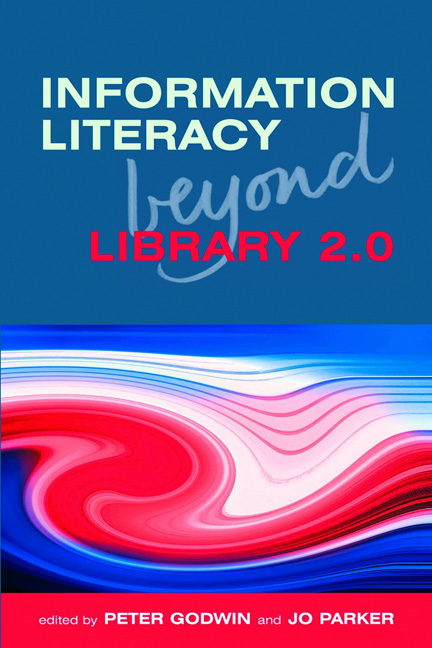Book contents
- Frontmatter
- Contents
- Contributors
- Acknowledgements
- Introduction
- PART 1 RECENT DEVELOPMENTS IN INFORMATION LITERACY AND LIBRARY 2.0
- PART 2 CASE STUDIES
- PART 3 WHAT IT MEANS FOR INFORMATION PROFESSIONALS
- 18 Helping the public online: Web 2.0 in UK public libraries
- 19 Change has arrived at an iSchool library near you
- 20 Information literacy: a path to the future
- 21 Thoughts about the future
- 22 Last word: information literacy beyond Library 2.0
- Index
21 - Thoughts about the future
from PART 3 - WHAT IT MEANS FOR INFORMATION PROFESSIONALS
Published online by Cambridge University Press: 09 June 2018
- Frontmatter
- Contents
- Contributors
- Acknowledgements
- Introduction
- PART 1 RECENT DEVELOPMENTS IN INFORMATION LITERACY AND LIBRARY 2.0
- PART 2 CASE STUDIES
- PART 3 WHAT IT MEANS FOR INFORMATION PROFESSIONALS
- 18 Helping the public online: Web 2.0 in UK public libraries
- 19 Change has arrived at an iSchool library near you
- 20 Information literacy: a path to the future
- 21 Thoughts about the future
- 22 Last word: information literacy beyond Library 2.0
- Index
Summary
Introduction
The speed of change fascinates me. With the coming of the internet everything changed, and with Web 2.0 it has changed yet again. YouTube took up more bandwidth in 2007 than the entire internet in 2000. Many mobile phones now have more computing power and internet capability than the average home computer of 2000 (Thomas and Brown, 2011). However, education changes slowly. Institutions are changing far more slowly than are modes of learning, which are becoming more participatory and collaborative (Davidson and Goldberg, 2009). Think of your own workplace and your own colleagues and friends. Real change is slow. In this chapter I will cover some important likely trends and what they may mean to us, as IL practitioners, in the future.
Streams of information and coping with the flow
Information overload is going to increase. This is not just the amount of information being added to the web every day, and its being searchable via Google. It is about coping with the flow of information: the flood of RSS feeds, blog posts or tweets. We need to be able to ‘sample’ the flow (Rheingold, 2010). The tools we use to do this will change, evolve and interrelate. The challenge will still be to channel the right stuff and to control it. Web 3.0 could bring search engines that bring together results into a synthesized report – but many of the promised improvements in search have not yet occurred (Herring, 2011). So we can still say ‘Information overload is not the problem. It's filter failure’ (Shirky, 2008). Boyd (2010) places us all in a stream of networked content that we grab as it goes by, as opposed to broadcast models of information and entertainment. In Chapter 4, Phil Bradley and Karen Blakeman have shown how search engines now take our location, occupation, interests and social media activity into consideration when presenting results to us. How many of our users (or our librarian colleagues, for that matter) realize that different results appear for the same search in different locations? In a world where Google is so trusted, it is important that someone should inform people that the results they get will vary: from person to person, from place to place, at the same time and at different times.
- Type
- Chapter
- Information
- Information Literacy Beyond Library 2.0 , pp. 241 - 256Publisher: FacetPrint publication year: 2012



